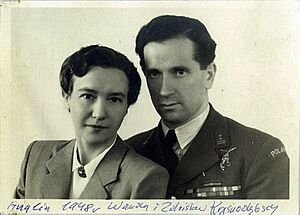Zdzisław Krasnodębski facts for kids
Zdzisław Krasnodębski (born July 10, 1904, died July 3, 1980) was a brave Polish pilot. He was also known by his nickname, Król, which means "King". He became famous for starting and leading the amazing No. 303 Polish Fighter Squadron. This squadron played a very important role during World War II.
Contents
Early Life and Pilot Training
Zdzisław Krasnodębski grew up in Poland. He went to school in cities like Siedlce and Warszawa. When he was just 16 years old, in 1920, he joined the army. This was during the Polish-Soviet War.
After his time in the army, he finished high school. Then, he was accepted into the Officer's Flight School. This school was first in Grudziądz and later moved to Dęblin. He worked very hard to become a pilot.
In 1928, Zdzisław graduated as a Second Lieutenant. He joined the 1st Flight Regiment in Warsaw. He continued his flight training, learning how to fly fighter planes. Soon, he was assigned to the 111th Fighter Squadron. This squadron was named after Tadeusz Kościuszko, a Polish hero.
Protecting Polish Skies
Zdzisław Krasnodębski continued to serve in the Warsaw regiment. He spent several years as a second lieutenant. Later, he became a unit commander. He was very active in his squadron.
In the mid-1930s, foreign planes often flew into Polish airspace without permission. In 1936, Krasnodębski's squadron moved to an airfield in Sarny. Their job was to stop these planes. They often intercepted Soviet Air Force planes flying over the Polish border.
During one event, Krasnodębski ordered his pilots to shoot at a plane that ignored warnings. This shows how serious he was about protecting his country.
World War II Begins
On September 1, 1939, World War II began. Captain Krasnodębski was leading the III/I Fighter Squadron. His squadron had 23 PZL P.11 fighter planes ready for combat.
On the very first day of the war, his pilots were busy. They flew missions from early morning. They stopped German bomber planes and fought against enemy fighters. During one flight, Krasnodębski's team shot down a German Dornier Do 17 bomber. It crashed in flames.
On September 3, six Polish planes led by Krasnodębski fought German Bf 110 fighters. Over Wyszkow, Krasnodębski's plane was shot down. He had to parachute out. A German pilot tried to shoot him while he was in his parachute. But another Polish pilot, Lt. Arsen Cebrzynski, saved him by shooting down the German plane.
Krasnodębski was burned, but he kept leading his squadron. When the Soviet Union invaded Poland on September 17, 1939, he led nine planes across the border to Romania. Many Polish airmen then traveled to France to keep fighting. Later, in May 1940, they had to move to the United Kingdom.
The Battle of Britain and 303 Squadron
Between June 18 and 24, 1940, over 8,500 Polish airmen escaped from France to England. Most of these fighter pilots joined the new No. 303 Polish Fighter Squadron of the RAF. Squadron Leader Ronald Gustave Kellett and Krasnodębski shared command of this new squadron.
The 303 Squadron quickly proved its skill. On August 30, 1940, Lt. Witold Paszkiewicz made the squadron's first kill. The next day, the Polish fighters went on their first mission over England. They destroyed six German Bf 109 planes without any losses.
A Close Call in the Sky
On September 6, 1940, the 303 Squadron was in a tough fight. They claimed five Bf 109s were destroyed. But the squadron also suffered losses. Both squadron leaders, Krasnodębski and Kellett, were hit. Krasnodębski was badly burned.
He was about to attack a bomber when an unseen Bf 109 shot his plane. Burning fuel spilled into his cockpit. Even though he was blinded by the fire, Krasnodębski managed to escape his plane. He waited until he was far from the fight before opening his parachute.
Another pilot, Witold Urbanowicz, saw him. Urbanowicz circled Krasnodębski's parachute all the way down to protect him. Krasnodębski landed near Farnborough. Local Home Guard members found him. They realized he was not German and called for an ambulance. He spent several years in the hospital because of his severe burns. Doctors thought he might never fly again.
303 Squadron's Amazing Success
Despite Krasnodębski's injury, the 303 Squadron continued to fight bravely. They became the most successful RAF squadron during the Battle of Britain. They claimed 126 enemy planes destroyed during this period. Their bravery and skill were a huge help in defending Britain.
 | May Edward Chinn |
 | Rebecca Cole |
 | Alexa Canady |
 | Dorothy Lavinia Brown |


